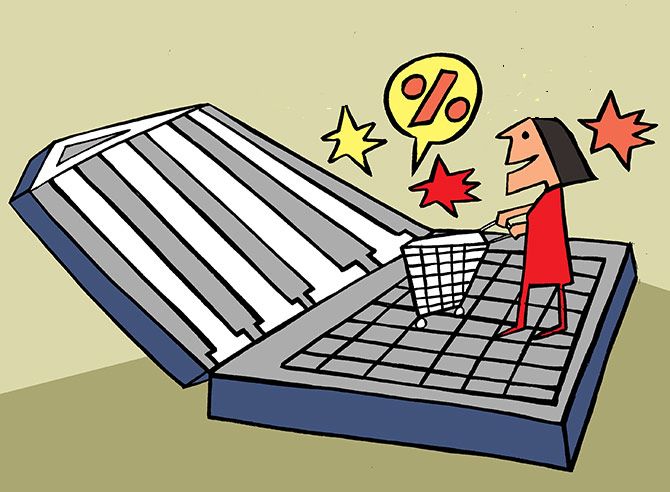 | « Back to article | Print this article |
However, many of these firms were facing an uphill task of convincing the people on the ground to return to work, as many are apprehensive of their safety.

E-commerce companies, especially those selling grocery online, said on Thursday they had resumed services as situations on the ground improved.
Most states took several measures including providing passes to delivery executives and eased interstate movement of essential goods being transported by these firms.
However, some sources also said many of these firms were facing an uphill task of convincing the people on the ground to return to work, as many are apprehensive of their safety.
“Things are a lot better now. We have started (operations) in all cities, with clear permission from the authorities, and all our warehouses are open now,” said Hari Menon, co-founder and CEO, BigBasket.
“Yesterday, the Central government and states gave clear instructions to make sure this does not happen again.
"While passes are being issued, local policemen have also been informed to allow the executives based on their uniforms and badges,” he said.
BigBasket, the country’s largest online grocer, presently operates in 24 cities.
The company also provides services in some adjoining cities.
Menon said since there was a huge order backlog, the focus was on clearing those, so as to create capacities for taking fresh orders.
“It is taking 4-5 days to deliver the orders now, which will come down as we clear the backlogs.
"It will take may be a day or two to clear the backlog, as the (delivery) people who had stopped working after being beaten up by police are coming back.
"Fortunately, most of them were in the city itself, as transport has been suspended.”
Flipkart also said Supermart, its Bengaluru-based grocery business, had resumed taking orders from Wednesday night.
The firm said is was taking steps to get passes for its on-field executives.
“We halted (earlier) because of the problems faced by our on-ground staff.
"But we are back now and our entire machinery is working to make things right,” said a company source.
Flipkart’s grocery service is presently available in Bengaluru, Mumbai, Delhi NCR, Chennai, and Hyderabad.
Amazon India’s website says considering the prevailing extensive lockdowns and restrictions, pending deliveries would be delayed.
It also said new ordering was available only on essential products through pre-paid payment methods.
“We are continuously evaluating the situation and working towards resuming deliveries soon,” said Amazon.
Milkbasket, a subscription-based micro-delivery start-up, has also announced resuming operations across Gurugram, Noida, and Bengaluru.
In terms of losses, over 50 plus communities were denied entry to Milkbasket in the past few days, without prior notice, resulting in dumping of 15,000 litres of milk and throwing of over 10,000 kgs of fruits and vegetables.
“Our employees and vendors are scared for their own families, but they came out on Wednesday, managing to deliver whatever they could to 30,000 families,” said Anant Goel, chief executive and co-founder, Milkbasket.
Online food delivery companies, however, have not been as lucky, given several states are yet to recognise them as essential services.
Swiggy said it was managing to operate in select cities with limited capacity and it was also dependent on the functioning of restaurants.
“While the Centre has allowed it, it has not been allowed in some states. For example, Delhi and Karnataka have allowed it, while Tamil Nadu and Punjab have not,” said Vivek Sunder, chief operating officer, Swiggy.
Companies like his, Sunder said, are required to take three layers of approvals in order to be able to operate.
The first one from Central level, the second from state-level authorities. Then one needs to be permitted by the policemen on duty.
“Literally, no state has all three things sorted out. Though Karnataka is certainly ahead of others on this front,” Sunder said.
According to the ministry of home affairs guidelines for the 21-day lockdown, e-commerce is included as part of essential services for delivery of important goods, including food, pharmaceuticals, and medical equipment.